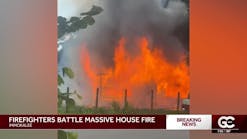Scorching heat is sucking the moisture out of shrubs and trees, providing fuel for new fires in Oregon, Washington and Colorado. In all, 20 large fires were burning across the West on Wednesday.
A blaze 40 miles north of Grand Junction in western Colorado grew to 2,000 acres, more than doubling in size overnight. Smaller fires burned in the foothills southwest of Denver and in the state's central mountains.
Conditions have changed quickly in parts of the Rockies, where spring rains had eased the drought still gripping the Southwest.
``Last week, the only place to go on a fire was in Arizona and New Mexico. All of a sudden, Colorado is right back on the radar screen,'' said Justin Dombrowski of the Boulder Fire Department.
The fire danger ranged from high to extreme in parts of Colorado, Wyoming, Utah, Arizona, New Mexico, Oregon and Washington, according to the National Interagency Fire Center in Boise, Idaho.
Meanwhile, humid weather helped dampen an 83,000-acre blaze that has destroyed hundreds of homes near Tucson, Ariz. Higher humidity and cooler weather have also slowed a 2,500-acre fire on Taos Pueblo land in New Mexico.
``In the Southwest, we're seeing the first signs of the midsummer monsoon,'' said Don Smurthwaite, a fire center spokesman. ``In general, that signals the beginning of the end of the fire season in Arizona and New Mexico.''
No such luck across other parts of the West. Experts said the wet weather that delayed the fire season in the northern Rockies was a mixed blessing.
``It allowed a bumper crop of grasses and bushes,'' Smurthwaite said. ``That sets us up with a tremendous fuel load.''
Last summer was one of the worst fire seasons on record for the West. By this time last year, 3.16 million acres had burned; this year, the figure is 993,934 acres.
Related:





